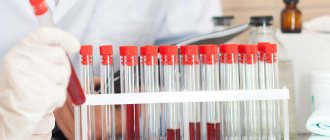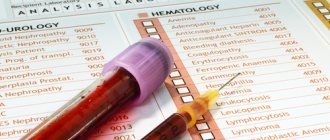Innovative technologies used during laboratory research provide accurate, reliable data. It is possible to determine the minimum concentration of a substance or compound.
Expert opinion
Kovaleva Elena Anatolyevna
Doctor-Laboratory Assistant. 14 years of experience in clinical diagnostic services.
Ask a question to an expert
A blood test for hCG is often used in diagnosis. Based on its results, it is determined whether a woman is pregnant or not , and whether a pathological process develops in this case.
HCG: what is it?
Human chorionic gonadotropin, or hCG for short, is a protein compound that by its nature belongs to specific hormones. They are produced exclusively during pregnancy; embryonic tissues are responsible for their production. It is thanks to the synthesis of the hormone in the early stages of pregnancy that accurate test results are ensured. At this time, the chorion is formed - the embryonic membrane , providing it with nutrients. At the twelfth or fourteenth week, the chorion transforms into the placenta. Both membranes produce human chorionic gonadotropin. It is contained in the blood. The concentration of the hormone may change during pregnancy.
Characteristics and significance of hCG
The hCG hormone (human chorionic gonadotropin) is a special substance formed in a pregnant woman to protect the fetus from the aggressive effects of the maternal body. The hormone gets its name from the gonads (another name for the ovaries), on which it has a targeted effect.
HCG has several very important missions:
- With the help of hCG, progesterone is more dynamically produced, which is so necessary for a successful pregnancy.
- Gonadotropin ensures the development of the male embryo according to the male type, affecting its gonads.
- Protects the female body from possible fetal rejection.
The hCG level is determined during a blood test.
Analysis value
The chemical structure of the substance consists of two complex chains of amino acids. One of them, called alpha, almost coincides with the structural units of the pituitary gland, which are responsible for the production of hormones, the menstrual cycle and ovulation. The second group of amino acids, beta, is characteristically different due to human chorionic gonadotropin . During laboratory diagnostics, in order to identify it, the beta chain of amino acids found in the blood of women is examined directly.
Hormone synthesis occurs not only in the body of expectant mothers. It controls all hormonal phenomena, practically not obeying the pituitary gland. All hormones are replaced with human chorionic gonadotropin, which stimulates the placenta to produce progesterone and maintain pregnancy. At the same time, a constant level of estrogen is maintained. But hCG is not only produced in connection with fetal development.
Expert opinion
Kovaleva Elena Anatolyevna
Doctor-Laboratory Assistant. 14 years of experience in clinical diagnostic services.
Ask a question to an expert
Some pathological processes also contribute to its increased level, so it is important to monitor test results and symptoms of the patient’s condition.
The hormone can be increased due to inflammation and tumors in the organs of the reproductive system.
Why is the analysis prescribed?
What does hCG analysis mean, and why is it prescribed? This substance is responsible for many processes occurring in the female body during the entire gestation period. Under its influence occurs:
- stimulation of progesterone production;
- maintaining normal estrogen levels throughout pregnancy;
- preventing an “attack” by the cells of the maternal immune system of the embryo, which is perceived by the immune system as a “foreign” element;
- promoting the normal course of physiological changes in the body of the expectant mother;
- stimulation of the corpus luteum.
When is an hCG test done? Indications for performing the test may be related not only to pregnancy, and this is important for every woman to know.
When and why is research conducted?
Why donate blood for hCG? This question interests many women - both pregnant and non-pregnant - who have been referred by a gynecologist for this study. There are a lot of situations when this test is carried out, so it makes sense to consider them all.
So, indications for hCG analysis are:
- prolonged absence of menstruation with a negative test;
- the need to confirm pregnancy;
- suspicion of the presence of remaining embryonic tissue after an abortion;
- control of the gestational period;
- identifying the risk of developing genetic disorders in the fetus.
In addition, situations when it is necessary to donate blood for hCG are the need to diagnose malignant tumor processes - both in the woman herself and in the baby, identification of severe pathological abnormalities in a pregnant patient, suspicion of fetal failure or its death. Suspicion of an ectopic pregnancy, the need to confirm multiple pregnancy, a history of miscarriage or the threat of such at the current time - all these cases require mandatory completion of this study.
See also:
Reasons for increased hCG during and without pregnancy
Indications for the study
Blood sampling is done in certain cases prescribed by medicine. Their list is determined by the following goals and objectives:
- long-term absence of menstruation or delay;
- detection of pregnancy at any stage, the beginning of which is considered to be 5-6 days from the fusion of the egg with the sperm;
- diagnosing abnormalities during pregnancy - ectopic, frozen, multiple, slowly developing, with the threat of losing the child;
- if you suspect an incorrectly performed abortion or negative consequences after it;
- taking scheduled tests in the period from 12 to 14 and from 17 to 18 weeks;
- diagnosing possible abnormalities in fetal development;
- the risk of malignant tumors localized in the placenta, digestive or genital organs.
Expert opinion
Kovaleva Elena Anatolyevna
Doctor-Laboratory Assistant. 14 years of experience in clinical diagnostic services.
Ask a question to an expert
Based on the test results, one can judge whether there is a pregnancy, how it develops , and whether there is any pathology in the fetus.
Human chorionic gonadotropin (hCG, beta-hCG, b-hCG, Human Chorionic)
Early diagnosis of pregnancy: determination of hCG levels
What is hCG?
HCG (human chorionic gonadotropin) is a special pregnancy hormone, which is an important indicator of the development of pregnancy and its abnormalities. Human chorionic gonadotropin is produced by the cells of the chorion (the membrane of the embryo) immediately after its attachment to the wall of the uterus. Based on a blood test for human chorionic gonadotropin, the doctor determines the presence of chorionic tissue in the body, and therefore the onset of pregnancy in a woman.
When can a test be performed to determine hCG levels?
Determining the level of human chorionic gonadotropin in the blood is the most reliable method for determining pregnancy in the early stages. Human chorionic gonadotropin appears in a woman’s body 5-6 days after fertilization. A common rapid pregnancy test, which every woman can use at home, is also based on the determination of human chorionic gonadotropin in the urine, but the required level of this hormone in the urine to diagnose pregnancy is achieved several days later.
In the absence of any pathology, in the first weeks of pregnancy the level of the hormone doubles every 2 days, and its maximum concentration is reached by 10-11 weeks of pregnancy. After week 11, the hormone level gradually decreases.
An increase in the level of human chorionic gonadotropin during pregnancy can occur with:
- multiple births;
- toxicosis, gestosis;
- maternal diabetes;
- fetal pathologies, Down syndrome, multiple developmental defects;
- incorrectly determined gestational age;
- taking synthetic gestagens, etc.
Elevated values can also be seen within a week when tested after an abortion procedure. A high level of the hormone after a mini-abortion indicates a progressive pregnancy.
Low levels of human chorionic gonadotropin during pregnancy may indicate incorrect timing of pregnancy or be a sign of serious disorders, such as:
- ectopic pregnancy;
- non-developing pregnancy;
- delay in fetal development;
- threat of spontaneous abortion;
- chronic placental insufficiency;
- fetal death (in the II-III trimester of pregnancy).
Determining the level of human chorionic gonadotropin is part of a triple test study, the results of which can be used to judge the presence of certain abnormalities in fetal development, but an accurate diagnosis cannot be made. The study only allows us to identify women at risk. In this case, women will need to undergo serious additional examination.
What is the role of the hCG hormone in the human body?
In addition to establishing the fact of pregnancy, by quantifying the level of this hormone, one can judge the nature of the pregnancy and the presence of multiple pregnancies.
The most important task of human chorionic gonadotropin is to maintain the pregnancy itself. Under its control, the synthesis of the main pregnancy hormones occurs: estrogen and progesterone. In the first trimester, until the placenta is fully formed (up to 16 weeks), human chorionic gonadotropin maintains the normal functional activity of the corpus luteum, namely the production of progesterone.
Another important function of human chorionic gonadotropin is to stimulate ovulation and maintain the viability of the corpus luteum.
When does a doctor order a hCG test?
In addition to diagnosing early pregnancy, human chorionic gonadotropin is determined by:
among women -
- to detect amenorrhea;
- eliminating the possibility of ectopic pregnancy;
- to assess the completeness of induced abortion;
- for dynamic monitoring of pregnancy;
- if there is a threat of miscarriage and suspicion of an undeveloped pregnancy;
- for the diagnosis of tumors - chorionepithelioma, hydatidiform mole;
- for prenatal diagnosis of fetal malformations;
for men -
- for the diagnosis of testicular tumors.
How to take a blood test for the hCG hormone?
The independent laboratory INVITRO offers a laboratory test to determine the level of human chorionic gonadotropin.
The test is taken by taking blood from a vein, preferably in the morning and on an empty stomach. A laboratory test is recommended to be carried out no earlier than 4-5 days of missed menstruation, and can also be repeated after 2-3 days to clarify the results. To identify fetal pathology in pregnant women, it is recommended to take the test from 14 to 18 weeks of pregnancy.
In a comprehensive diagnosis of fetal malformations, it is also recommended to take tests to determine the following markers: AFP (alpha-fetoprotein), E3 (free estriol), and also do an ultrasound.
How to prepare for donating blood?
Before the collection procedure, the doctor is obliged to instruct the patient on how to properly prepare for it. Based on general recommendations, you can get an idea of what the preparatory stage should be like. To have an idea of whether the patient is pregnant or how the fetus is developing, venous blood is taken. Proper preparation for research involves:
- carrying out the procedure exclusively in the morning;
- abstinence from food - blood is taken only on an empty stomach;
- when taking the hCG test during lunch hours, you are allowed to eat a maximum of 4-6 hours before;
- informing the doctor about what medications or hormonal medications have been taken over the past weeks;
- At least 3-5 days should have passed since your period was missed.
If all the above conditions are met, the test results will be reliable. If there is any doubt, repeated diagnostics are done at intervals of several days. Sometimes, to ensure the reliability of the data, it is suggested to undergo an ultrasound examination , but in the early stages this is not recommended. It is better to wait until at least 14 or 18 weeks so as not to harm the baby.
Everything you need to know about the hCG test
When can you donate blood for hCG? It should be borne in mind that this study is one of the most complex types of laboratory diagnostics, so it is important not only to prepare correctly and well for it, but also to know exactly when to visit a doctor to receive a referral for analysis.
If we are talking about confirming pregnancy, then in this case the day when the fertilized egg is attached to the uterine wall plays an important role. This process can take from 8 to 14 days from the moment the sperm fuses with the egg. Therefore, if you are concerned about a possible pregnancy, you can consult a doctor and get tested approximately 8-10 days after unprotected sexual intercourse.
Note. Some girls have a question about what day to take hCG if there is a delay. If your period does not come on time, and the delay is quite long, you should not put off going to the gynecologist. A shift in the menstrual cycle is not always associated with pregnancy. Moreover, sometimes a test for this hormone protein gives inflated results in the absence of fertilization of the egg. In this case, we can talk about serious pathologies that must be diagnosed and treated.
How to prepare?
Having figured out the question of what day to donate blood for hCG, let’s move on to an equally important topic - how to prepare for this process? A woman should take into account that the test requires only biomaterial taken from the main vein in the arm.
And although this hormone can be determined in the urine, nevertheless, a biochemical study gives more accurate results. In addition, if we consider the situation from the point of view of when CHB begins to grow in the blood, then this happens immediately after conception. But the appearance of this specific protein in urine is observed much later. Therefore, it is better, nevertheless, to donate blood, although this is not a very pleasant “pleasure”.
How to take an hCG test - on an empty stomach or not? It is best to donate venous blood on an empty stomach. Moreover, on the eve of the test, it is necessary to remove all high-calorie foods from the menu, especially fatty foods and confectionery products.
Some girls are interested in whether it is possible to drink water before collecting biomaterial. Water cannot in any way affect the test results, so it is allowed to drink it in unlimited quantities both the day before and on the day of the test. But only on condition that it is mineral, but not sweet, and preferably without gas.
Another question is what time of day to take hCG. Unlike many other tests that require venous blood sampling, biomaterial for this study can be taken not only in the morning. Of course, the ideal time period is from 8 to 11 am.
But there are also exceptions. So, sometimes patients come for analysis after lunch (at 16-17 hours). And since the hCG test is taken on an empty stomach, there is only one requirement for such girls: that at least 5-6 hours must pass after eating, before taking blood. That is, if you “sinned” in the morning and had breakfast, you can come for analysis in the afternoon.
It’s a completely different matter that not all laboratories agree to conduct research during this period of time. Especially state-owned ones, so if you did not have time to undergo the diagnostic procedure in the morning, then you will most likely have to take the biomaterial in the afternoon in a paid private clinic.
Important nuances
Another important aspect regarding how to properly take an hCG test concerns the use of medications. She should inform her doctor about any pharmacological agents that a pregnant woman is currently using.
This is especially true for hormonal medications. They may have to be canceled for a while, or the analysis can be rescheduled until the end of the course of therapy.
Before taking the hCG test, the patient must achieve a state of complete physical rest. To do this, it is advisable to come to the laboratory half an hour before the scheduled time for blood sampling to sit down and rest. Also, a woman should remember that 2 days before the study she must exclude any sports activities, be it race walking or yoga for pregnant women.
To ensure that the results do not differ significantly from each other, it is recommended to donate blood the first and all subsequent times in the same place. This will make it easier for the doctor to track fluctuations in hCG, and the patient will not have to worry about sudden changes in indicators that occur when using different test technologies.
Is it better to take it on an empty stomach or not?
If you want the test results to be as reliable as possible, you need to donate blood on an empty stomach. The concentration of hCG allows you to determine the presence or absence of pregnancy and identify possible pathologies in its process.
Fasting analysis
When a laboratory test is carried out on an empty stomach, the hormone content is determined more accurately than with a similar urine test performed after a meal. There is a significant difference in time - a test for human chorionic gonadotropin using a venous blood sample can be done on the fifth or sixth day after the expected date of conception. By its level during pregnancy it is easy to determine how the fetus is developing and whether there are any deviations.
After meal
If you donate blood after a heavy lunch, the reliability of the results will be in question. With proper preparation for the test, pregnancy can be detected at an earlier stage. The first weeks of the term are characterized by a dynamic increase in the level of the hormone - its content almost doubles every two days. The hCG concentration will reach its maximum point by the end of the first trimester, and then begin to gradually decrease. Then the placenta becomes the hormonal center.
If you eat heavily several hours before the procedure, it may become impossible to complete it, or there will be problems with decoding the data. After eating, the process of absorption of nutritional components begins, the content of protein, fats, and carbohydrates changes. Enzymes are activated to efficiently process food. The thickness of the blood changes, the concentration of hormones increases , which can lead to a false result.
Expert opinion
Kovaleva Elena Anatolyevna
Doctor-Laboratory Assistant. 14 years of experience in clinical diagnostic services.
Ask a question to an expert
In some cases, eating food does not have a significant effect on performance, but it is better not to take risks. An incorrect diagnosis can lead to negative consequences and harm your health.
Carrying out analysis
If the hCG rate according to the table at some stage of pregnancy differs from the results obtained, the study should be repeated after some time.
After blood collection, plasma must be obtained. This is done in a centrifuge, which separates the blood cells from the plasma. The following stages of the test are done by specialists using special reagents.
The concentration of the hCG hormone during pregnancy allows you to monitor hCG levels from the moment of egg implantation until birth.
It must be remembered that hCG can be determined in urine and amniotic fluid. To determine pregnancy, you need to take a hCG test on a certain day after ovulation, the result will be reliable already on the 10th day.
When the baby is developing correctly, the woman compares the results with the table and watches how the level grows over the days and weeks. In this case, she can see for herself that everything is going well.
Determination of hCG in urine after ovulation allows for IVF monitoring; an increase in the hormone indicates success in the manipulation.
When the test result will be ready depends on different clinics. Basically, you don’t have to wait long for the result; the woman gets the result within a day.
By following all the recommendations for preparing and conducting the analysis, as well as taking into account all possible nuances, you will no longer wonder how to correctly take hCG for pregnancy in order to get the most reliable and expected result of a biochemical blood test.
How to submit?
Not only your awareness of the existence of pregnancy, but also control over its condition and the body of the expectant mother depends on the veracity of the indicators. If in the early stages it is of great importance to determine or refute the very fact of pregnancy, then at later stages attention is paid to the development of the fetus and the exclusion of anomalies.
Relevance of preparation
Many people think that they can just come, donate blood without prior instructions or preparation, and then get a true result. Some do this out of ignorance because not all doctors warn their patients how to take tests correctly. Few people are able to think on their own why they should prepare for such a procedure.
If certain rules are not followed, incorrect data . Then it will not be clear whether there is a pregnancy or how it is developing. It’s worse if a non-existent pathology is identified in the development of the fetus and true anomalies are not noticed. All this can negatively affect the health of the woman and her baby.
What are the rules for donating blood for hCG?
In order to determine its concentration, venous blood is taken. It is not recommended to make sudden movements before the procedure - you need to sit quietly in place for at least 15-20 minutes, and then do it.
Expert opinion
Kovaleva Elena Anatolyevna
Doctor-Laboratory Assistant. 14 years of experience in clinical diagnostic services.
Ask a question to an expert
Blood is taken in the morning. It is at this time that there is a sufficient concentration of human chorionic gonadotropin if the woman is actually pregnant.
By lunchtime, the level may drop, and if it is earlier, the hormone content will be weaker. Then pregnancy or pathology may not be detected.
If you take medications, especially hormonal drugs, during the last weeks before the procedure, you must inform your doctor about this, because this may affect the quantitative indicators. On the day of the test, you should not physically overload your body or have sex.
When to take it
It is allowed to donate blood for hCG at any time of the day (including in the evening), but doctors advise coming to the laboratory early in the morning. This is due to the fact that the analysis is done on an empty stomach, like many other types of research.
Before the procedure, you should avoid eating food, water, juices and other drinks.
At least 4-6 hours should pass between blood donation and the last meal.
Doing the test on a full stomach is strictly prohibited.
How long does it take to get results after donating blood?
The duration of the procedure for diagnosing blood for human chorionic gonadotropin is several hours. When the analysis was carried out in the morning, the results will be ready on the same day or the next day. It all depends on the level of workload of laboratory technicians and the degree of provision of reagents - chemical substances necessary for laboratory research.
If laboratory workers have a heavy workload or there is a need to save reagents, sample diagnostics are done at intervals of 2-3 days, when the required number of samples is accumulated. In this case, you will get the result in a few days.
Dynamics of hormone levels during pregnancy
The table will help you understand the peculiarities of the increase in the level of hCG in the blood of women during pregnancy. It shows the timing of gestation and the corresponding numerical values of the hormone in the blood during this period.
| Duration by week | Average units (mIU/ml) | Normal range (mIU/ml) |
| 2 | 150 | 50-300 |
| 3-4 | 2000 | 1500-5000 |
| 4-5 | 20000 | 10000-30000 |
| 5-6 | 50000 | 20000-100000 |
| 6-7 | 100000 | 50000-200000 |
| 7-8 | 80000 | 35000-150000 |
| 9-10 | 70000 | 32000-130000 |
| 10-11 | 65000 | 30000-120000 |
| 11-12 | 60000 | 27000-110000 |
| 13-14 | 50000 | 25000-100000 |
| 15-16 | 45000 | 20000-70000 |
| 17-20 | 30000 | 15000-55000 |
According to the described principle, indicators change in women with a normal pregnancy. It should be taken into account that the standards applied by different medical centers vary and depend on the methods used to conduct the examination. Individual laboratories provide their patients with a specific transcript stating the normal range of values.
Attention! If a questionable result is obtained (values from 5 to 25 mIU/ml), the test is considered invalid. The presence of pregnancy is checked again after 2-4 days.
What could be the result?
Expert opinion
Kovaleva Elena Anatolyevna
Doctor-Laboratory Assistant. 14 years of experience in clinical diagnostic services.
Ask a question to an expert
Sometimes laboratory test data may be unreliable. This is due to errors during the analysis, improper preparation for it, when the stipulated rules are not taken into account.
Errors occur in the absence of proper storage conditions for research reagents, but this is very rare.
Negative test
If the hCG level is very low, this may indicate late implantation of the reproductive cell or lack of pregnancy. When in doubt, it is better to take a second test or undergo ultrasound diagnostics.
Inflated figures
They are observed during multiple pregnancies - each fetus increases the concentration of the hormone by a certain number of units. Sometimes this happens when there is an error in calculating the gestational age. Anomalies in fetal development and toxicosis also lead to an increase in its level in the blood of the expectant mother.
Properties of hCG
HCG is responsible for maintaining the functional activity of the corpus luteum in the first trimester, stimulates the production of estrogens and progesterone necessary to maintain pregnancy, as well as Leydig cells, which are responsible for the synthesis of testosterone in the male fetus. Quantitative indicators of this hormone allow not only to conduct a highly accurate pregnancy test, but also to identify the risk of abnormalities in the development of the placenta and fetus (in combination with tests for alpha-fetoprotein and free estriol).










